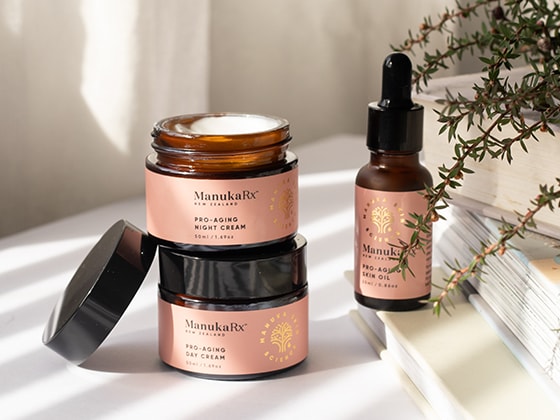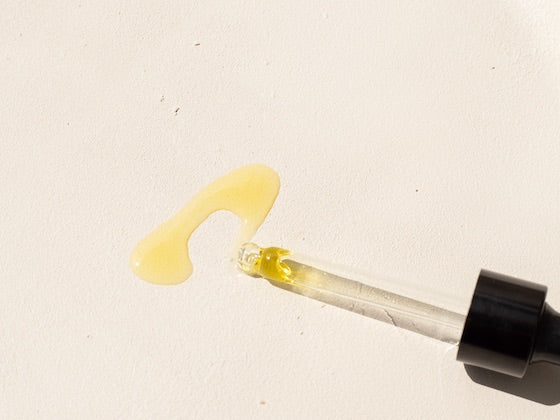Mānuka Honey and Mānuka Oil -- What’s The Difference?
Now when most consumers think of mānuka they think of mānuka honey and are generally not aware of mānuka oil at all. The properties of medical grade honey for wound care products are widely known, but mānuka oil? Not so much. We prepared an infographic to summarise the main differences of mānuka honey and mānuka honey to help you understand better.
 Both are used for medicinal purposes, but mānuka oil is 100% vegan - no bees involved in the process. And mānuka oil is 1,000x more effective than mānuka honey against gram-positive bacteria (that's a lot).
Both are used for medicinal purposes, but mānuka oil is 100% vegan - no bees involved in the process. And mānuka oil is 1,000x more effective than mānuka honey against gram-positive bacteria (that's a lot).
There has been extensive research carried out on the effectiveness of mānuka oil since the 1980s, though its properties and effectiveness are not widely recognised by consumers.
Where does Mānuka Oil come from?
Mānuka oil is an essential oil, steam distilled from the leaf and small branch of the mānuka bush. Oil sacs occur in the leaves of mānuka and appear as translucent points on the leaf surface.
The oil is extracted from the leaves by heating them to vaporise the oil, which is then distilled off. A distillation time of about 5 hours is required to extract 80–90% of the oil from mānuka because of the heavy oil components (sesquiterpenes).
The oil from the leaf volatilises into the water vapour flow then passing through the distillation vessel. This mixture is then cooled in a water-jacketed condenser, returning it to liquid water and oil. The oil, which is lighter than water, floats on the surface, enabling it to be collected in a separating vessel.
It’s a relatively simple process on the East Cape and you may get an idea from the short video here which shows a ton of mānuka leaf being emptied after the distillation process has been completed.

Are all mānuka oils made the same?
Not all oils are created equal.
NZ Crop and Food have defined three predominant mānuka oil chemotypes (races of plants with different chemistry) throughout New Zealand:
1. In the far north, the oil has a high pinene content.
2. In the East Cape and Marlborough Sounds regions, a high triketone chemotype is found.
3. Oils containing a complex of sesquiterpenes are found over the rest of New Zealand.
Evidence shows that the antimicrobial activity of mānuka oil is determined largely by the proportion of triketones in the oil.
The proportion of chemical components in the three regional chemotypes of New Zealand mānuka. [i]

Currently most of our production of oil comes from wild harvest of the mānuka bush on the East Cape, however, ManukaRx is now involved in the development of plantations on the East Cape, specifically for mānuka oil production. ManukaRx only uses 100% pure East Cape mānuka oil in all product formulations.

What can Mānuka Oil do for the body and the skin?
Mānuka oil, particularly the triketone-rich chemotypes, has activity against pathological bacteria, e.g. Staphylococcus, Listeria, and Streptococcus, and against some fungi, e.g.Trichophyton and Microsporum.
Oil from the East Cape chemotype is a triketone rich selection, and the unique strong activity of this oil against Gram-positive bacteria—for example, Staphylococcus aureus and its antibiotic-resistant strain MRSA, has been conclusively proven to be due to the presence of triketones.
Mānuka oil is antimicrobial [ii]
Mānuka oil contains β-triketones, natural compounds that kill or stop the growth of micro-organisms. These compounds can be broken down into anti-bacterial and anti-fungal agents. They stimulate immune responses in wounds, speeding up healing times.The most widely studied property of mānuka oil is its amazing antibacterial abilities. An Otago University study showed that it was effective against the specific bacteria that cause acne. Another study, published in the Journal of Microbiology, analysed microorganism growth and found that mānuka oil significantly inhibited the growth of the bacteria S. aureus, S. mutans, S. sobrinus, and E. coli. Mānuka oil was found to be effective against some antibiotic-resistant ‘superbugs’, including MRSA.
In the same Journal of Microbiology study, researchers found that mānuka oil has potent fungicidal properties capable of inhibiting the growth of fungi.
It contains anti-ageing and antioxidant properties
A 2013 study[iii] showed that a topical application suppressed the UV-B induced increase in skin thickness and wrinkle grading in a dose-dependent manner. Mānuka oil also could suppress UV-B induced skin inflammation by inhibiting the production of inflammatory cytokines. They suggest that it is the presence of antioxidant chemicals and sesquiterpene compounds in mānuka oil that underlie the attenuation of cutaneous photoaging. With these results, they suggest that their work supports the use of mānuka oil in the formulation of skincare and functional cosmetics.A 2014 study [iv] investigated suppression or inhibition of inflammatory reactions mediated by mānuka oil. They found that where the inflammation was caused by microorganism infection the oil had anti-inflammatory effects on LPS (lipopolysaccharide) induced release of TNF- alpha, but had no influence on IL-4. They also found that the oil did not have a stimulatory effect on cytokine release in untreated THP-1 macrophages. Because TNF-alpha release from monocytes/macrophages regulates Th-1 mediated inflammatory responses, short term non-toxic dosage for the oil may be effective in treating inflammation. In THP-1 cells, the oil lowered tumour necrosis factor-alpha released after lipopolysaccharide stimulation.
They suggest that the oil may be effective for treating lesions caused by insect bites and for repairing infected wounds. The fact that the oil did not significantly affect IL-4 release suggests that, in addition to the anti-inflammatory properties, the oil has potential application as an anti-allergenic agent and be effective in human epidermal- related products
Mānuka oil is capable of significantly reducing inflammation without irritating the skin, and has been demonstrated to be an effective treatment for some people with sensitive skin and those who suffer from eczema or psoriasis.
A 2005 study [v] showed that mānuka oil inhibited the Herpes simplex -1 and -2 virus when the viruses were pre-treated with the oil one hour before cell infection. After infection, only HSV- 1 replication was significantly inhibited. A similar study showed that flavesone and mānuka oil were the most active substances against Herpes simplex virus type 1 when in direct contact with the virus, but all of the triketones showed strong antiviral activity. ‘The mechanism seems to be an interaction of the triketones with the virion envelope hindering the adsorption of the virus by the host cell’.
In a study in 1998 [vi] mānuka oil showed a spasmolytic action on smooth muscle. Using the diaphragm, mānuka oil decreased tension and had a delayed contracture. The oil is also antispasmodic, meaning that it may be of benefit for the treatment of muscle strain or inflammatory conditions. Research is being conducted into mānuka oil for the treatment of arthritis and fibromyalgia.
Mānuka oil also contains calamenene, which is known to have skin calming and analgesic properties. These properties assist in wound healing and scar reduction. Mānuka oil works as a full treatment, first killing or reducing bacteria or fungal growth, then reducing inflammation and calming the skin, allowing for faster healing and less scarring.
So what are the Best Mānuka Oil uses?
Thanks to its abundant antiviral, antibacterial, antimicrobial, anti-inflammatory, antifungal, and antioxidant properties, mānuka oil could be (and has been demonstrated to be) an effective natural solution for many conditions and preventative care applications such as:- Persistent acne and blemishes
- Anything to do with the foot or nail
- Anything to do with dry or itchy skin
- Minor rashes, burns, and abrasions
- Shiny and soft hair
- Skin ageing and reducing wrinkles
- Inflamed skin from sunburns
- Protecting at-risk skin on lips, elbows, knees, and ankles
- Mosquito bites, bee stings, and other insect bites or stings
- Chaffed or irritated skin
- Minimizing old scars
- Sore muscles and aching joints
- Congestion and respiratory infections
- Studies show that mānuka oil is one of the best natural solutions for fighting bacteria in the mouth – beating tea tree, lavender, eucalyptus, and rosemary. Be careful not to swallow.
What is the difference between Tea Tree Oil and Mānuka Oil?
The Tea Tree Plant
Melaleuca is a plant that belongs to the myrtle family endemic to Australia and a small handful of nearby Pacific islands. By indigenous, it means that something has originated in one place yet it can be found in another, whereas endemic indicates exclusivity.Benefits of Tea Tree Oil
Tea tree oil is very safe – yet effective – for many topical and household applications due to its antifungal and antibacterial properties.What Tea Tree Oil has been used for
Tea tree oil has been used for several ailments and domestic uses. This list is by no means exhaustive but includes:- Insect repellent
- Household cleaner
- Skin tags
- Athlete's foot and ringworm
- Acne
- Add to shampoo and conditioner
- Dandruff and psoriasis
- Bug bites
- Sunburns and rashes
- Deodoriser
- Relief from congestion or respiratory infections
Let's Look at Mānuka Oil Closer
The Mānuka Plant
Mānuka also belongs to the myrtle family but goes by the scientific name of Leptospermum Scoparium. This plant is indigenous to New Zealand.Benefits of Mānuka Oil
Mānuka oil is filled with potent triketones, flavonoids, and other chemical compounds which give the substance powerful antibacterial and antifungal properties.Mānuka oil extracted from plants grown in New Zealand's East Cape region contain higher levels of triketones than oil from varieties grown elsewhere which make East Cape mānuka oil one of the most powerful natural antibacterial solutions.
What mānuka oil has been used for
Like tea tree oil, mānuka is extremely versatile and safe for frequent use both topically and in several household applications. Thanks to its antibacterial and anti-inflammatory properties, mānuka is great for:- Soothing sore muscles and aching joints
- Relieving congestion or respiratory distress
- Reducing the appearance of or removing skin tags
- Acne, minor skin infections, rashes, bug bites, and other skin conditions
- Athlete's foot, ringworm, and jock itch and nail fungus
- Helping with both eczema and psoriasis
- Burns, sunburn, scars and cuts
- Cracked hands, feet, and cuticles
- Dandruff and head lice
- Disinfecting door handles, shoes, clothing, keyboards, phones, and other household items
- Deodorising shoes, clothing, cars, and furniture
- Disinfecting your mouth and freshening breath as an oral rinse
- Brightening hair, skin, and nails
Mānuka Oil vs. Tea Tree Oil: The Key Differences
Triketones, flavonoids, and other enzymes are what give essential oils their antimicrobial, antifungal, and antibacterial properties.The Cawthron Institute in Nelson and the Otago University Microbiology Department have conducted extensive testing of East Cape mānuka oil against a wide range of human pathogens and concluded that East Cape mānuka oil was:
- 20-30 times more active than Australian tea tree oil against gram-positive bacteria.
- Several times more effective against strains of fungi.
- Effective against gram-negative bacteria and viruses.
Browse our range of natural East Cape mānuka oil skincare products and experience the magic of mānuka essential oil today!
Research and Studies
[i] Crop and Food Research ‘Essential oil production from Mānuka and kanuka
[ii] Cooke & Cooke M.D. (1994) "An investigation into the antimicrobial properties of mānuka & kanuka oils" Cawthron Report No 263, New Zealand.
[iii] Kwon, O.S.; Jung, S.H. and Yang, B.S. (2013) Topical Administration of Mānuka Oil Prevents UV-B Irradiation –induced Cutaneous Photoaging in Mice. Evidence-based complementary and alternative medicine. (10 pages) http://dx.doi.org/10.1155/2013/930857.
[iv] Chen, C-C; Yan S-H; Yen, M-Y; Wu, P-F; Liao, W-T; Huang, T-S; We, Z-H and Wang, H-M. D. (2014) Investigations of Kanuka and Mānuka Essential Oils for in vitro Treatment of Disease and Cellular Inflammation Caused by Infectious Microorganisms. Journal of Microbiology, Immunology and infection.
[v] Reichling, J.; Koch, C.; Stahl-Biskup, E; Sojka, C and Schnitzler, P. (2005) Virucidal Activity of a B- Triketone –rich Essential Oil of Leptospermum scoparium (Mānuka Oil) against HSV-1and HSV-2 in Cell Culture. Planta Medica 71(12):1123-1127.
[vi] Lis-Balchin, M. and Hart, S.L.( 1998) An Investigation of the Actions of the Essential Oils of Mānuka (Leptospermum scoparium) and Kanuka (Kunzea ericoides) Myrtaceae on Guinea-pig Smooth Muscle. J Pharm Pharmacol 50:809-811.







2 comments
Leonie Robertson
can this be purchased in Whangarei and if so where.
can this be purchased in Whangarei and if so where.
Erana
I’m from the East Cape of NZ and live in Australia. My dad used Manuka oil for oiling fine machinery as it was very fine. I often use the honey and cough lollies for colds 👍🏻
I’m from the East Cape of NZ and live in Australia. My dad used Manuka oil for oiling fine machinery as it was very fine. I often use the honey and cough lollies for colds 👍🏻